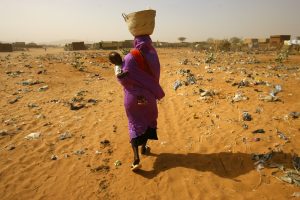Politics
Top CNN Reporter Reveals She Was Held Hostage By Militia In Sudan

A CNN reporting team led by Clarissa Ward faced grave dangers while documenting the plight of over 100,000 displaced individuals in Tawila, Sudan. The team, which arrived in North Darfur intent on covering the deepening crisis, navigated their way to Tawila—a sanctuary town for those fleeing the besieged city of El Fasher. The mission took an unexpected and perilous turn when Ward and her team were briefly held by a local militia.
The conflict in Darfur, Sudan, began in 2003, sparked by ethnic tensions, resource competition, and political struggles. Two rebel groups, the Sudan Liberation Movement (SLM) and the Justice and Equality Movement (JEM), accused the government of discrimination and neglect, prompting a harsh military response. Often seen as an ethnic clash between non-Arab groups and the Arab-dominated government, it has resulted in an estimated 300,000 deaths and 2.7 million displaced. Despite international intervention, including a UN-AU peacekeeping mission and the 2020 Juba Peace Agreement, violence persists. Political turmoil following Sudan’s 2019 revolution and 2021 coup has fueled recent clashes, leaving Darfur unstable and millions of civilians still at risk.
In face of the dangers, Ward’s team was committed to shedding light on the underreported crisis in Sudan, where over 10 million people have been displaced—nearly a quarter of the country’s population. Additionally, more than 26 million people are facing acute hunger.

via CNN
In August, a famine was officially declared at the Zamzam displaced people’s camp in Darfur, yet access for international journalists has been severely limited since the conflict began. After numerous failed attempts to secure entry permissions from the Sudanese Armed Forces (SAF) or the Rapid Support Forces (RSF), an invitation from the leadership of the Sudan Liberation Movement-Abdul Wahid (SLM-AW) to visit Tawila offered a potential breakthrough for reporting the situation.

via CNN
Upon arriving at the designated meeting point in Abu Gamra, the team did not find their expected hosts but instead encountered a rival militia equipped with rocket-propelled grenades and heavy machine guns mounted on Toyota Land Cruiser trucks. The team’s driver was taken away in chains to the local jail. For hours team members faced a barrage of questions in a cramped, windowless room. Interrogators demanded, “Why are you here?” “Who sent you here?” “Who gave you permission to be here?” Ward reported.
The journalist team, hoping for a safe passage to report on the famine in Darfur, found themselves in a precarious situation when they were intercepted by a rival militia instead of their expected hosts. Despite providing answers to the militia’s questions, they gained no insight into the identity or objectives of their captors. The initial relief at seeing their driver return unchained was short-lived as they were forced to follow the militants deeper into Darfur.
The journey escalated in tension when the general fired his gun, a move intended to intimidate. Later, the team was stopped by a dry riverbed where they were made to sit before the general and a security chief, marked by his turban and eye-covering sunglasses, in a display of power and control.
“Please, we are very frightened,” Ward said to them in Arabic. “I am a mother. I have three little boys.”
“Don’t be frightened, don’t be frightened,” the general replied, “We are human beings.”

Thousands of refugees living in the Darfur region of Sudan struggling to survive 2007
However, the situation escalated when the security chief demanded the personal phone numbers of the team’s partners to ostensibly assure them of their safety. Reluctantly, the journalist handed over her husband’s number, worried about the stress this would cause but hoping it might verify her story. Unbeknownst to them, an English speaker contacted their spouses from Port Sudan, far from their actual location, assuring them of their safety but also threatening long-term imprisonment if the incident was disclosed.
For the next 48 hours, the team was held under the watchful eyes of the general, the security chief, and around a dozen soldiers, including some alarmingly young. The journalist, as the only woman, faced additional hardships, restricting her food and water intake due to the lack of privacy. During their last day of captivity, the general and security chief left for six hours, leaving the journalists in the hands of younger fighters. The fighters instructed the journalists to unload their belongings from the vehicle, claiming they needed to take the driver to the market. This caused concern among the team about potentially being abandoned or handed over to another group. Nonetheless, they complied.
“It has been decided you will be released tomorrow,” Ward heard. “We thought you were spies but now you can go home.” Ward is well-known for her in-depth reporting from conflict zones, including Syria, Ukraine, Afghanistan, and Iraq. Her work has garnered multiple awards, including Peabody Awards, Emmys, and an Edward R. Murrow Award.
(FOCUS GROUP: Do You Blame KAMALA or TRUMP for record inflation?)

